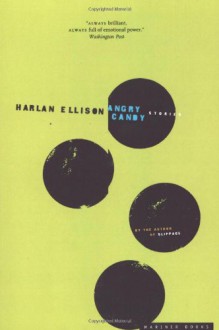
As we are about to enter into the season of Advent, how appropriate that I read a book themed around -- death? But for Harlan Ellison, death is not always the end of the story. In fact, in many cases death is the start of the adventure. I had not heard of Ellison before a friend of mine not only recommended him, but put this book in my hands. Prolific would be the defining word for this author who has over 1,000 stories, novels, screenplays, etc. to his claim. He has penned episodes for The Twilight Zone and Star Trek, and won numerous fantasy and science fiction awards.This collection is, according to Ellison in his introduction, "the twenty-second or -third or -fifth book of stories I've done." With no disrespect to his fiction, the introduction is the best part of this collection. It opens with death of his friend, Emily (whose death also appears in a couple of the stories) and Ellison's "insensitive" but honest eulogy. Listed next to the text on two pages are 44 deaths which touched him in a two-year period. In some cases they were close friends and in other cases acquaintances, but the overwhelming amount of death clearly shook the hardened writer. He is angry about the deaths and the pain the losses create and this book is his attempt to come to grips with what he has experienced.Which brings us to the last story, "The Function of Dream Sleep," in which the main character momentarily sees a mouth with teeth open near his stomach. When he goes to get help he eventually ends up with a group of people who take on the pain of others, but the character's pain is so great he actually kills several of them. Where does his pain come from? The loss of friends (including an Emily) which he has not been able to deal with in a positive way. He eventually seeks out a guru type figure who informs him the pain is from the dead whom he will not let go. He is told to "Let the mouth open...let the wind of the soul pass through, and take emptiness as a release." We end the book with "when he cried for them, he was, at last, able to say goodbye." The process is complete and Ellison seems to have worked through his anger and let his friends go.The stories in between the introduction and final story hit a range of topics, times, and creatures, but they all deal with death. The problem with prolific writers is usually that the quality ranges as well, and Ellison is no exception. Some of these are forgettable ("Escapegoat") and Ellison is prone to the last sentence surprise ending, like the ending of some bad jokes. But when he hits a story well it is well worth the effort. "Laugh Track" is a creatively written story in which a man follows his deceased Aunt through the years as her laugh shows up on laugh tracks over the decades. The twist is that the laugh track keeps her alive and he is able to connect with her, setting her off in a new direction. The story not only has a interesting premise, but shows a sense of humor as well -- a welcome diversion in this heavy book.The best story is the opening "Paladin of the Lost Hour," in which human temptation is all that holds us back from chaos as one person holds the key to a lost hour in time. Should the hour be used for personal reasons the time will disappear and the world will disappear. Ellison manages to make the holder of time both human and other worldly as he finds a new person to protect time.One of the more disturbing, yet most powerful, stories is "Broken Glass" in which a woman combats a rapist who enters her mind. Trapped on a bus she knows one of the men on the bus has entered her mind and raped her, but she does not know which person it is and he continues to taunt her. In the end she realizes she must use her mind to combat him. "On the Slab" is another standout in which a creature on display shows it is not yet dead, but there are those who want him that way. The "owner" goes from seeing this as a money-making venture to true compassion for the creature, and the relationship is touching.Of the seventeen short stories here a good editor could have dropped eight of them to make this a stronger book, but I get the impression that at this stage in his career Ellison calls his own shots. There are a couple of Ellison "essential" collections on his 35th and 50th writing anniversaries, which may be a better place start. But Ellison is definitely a writer who should drop into most people's reading lists at some point.He has also led a lively existence full of controversy, wives, and general mayham which you can read more about at Wikipedia if interested.

 Log in with Facebook
Log in with Facebook 








